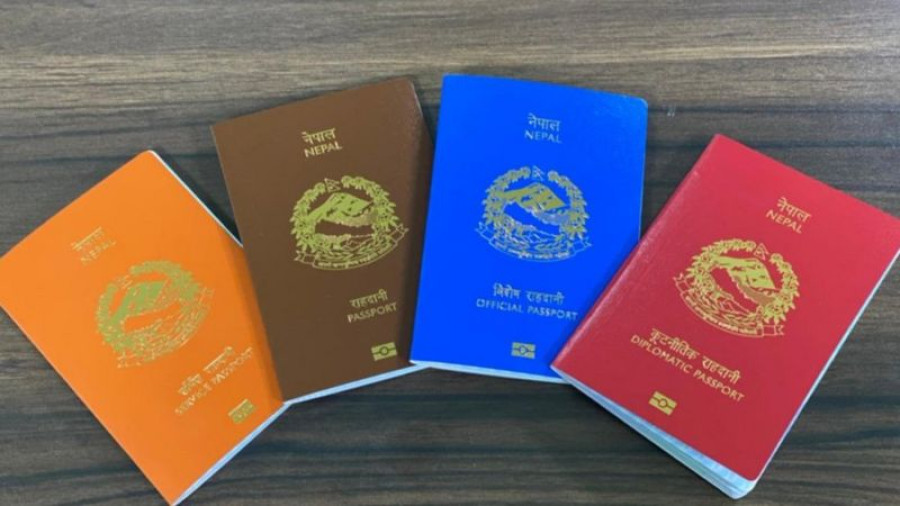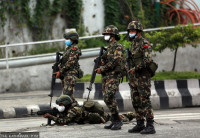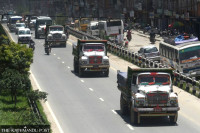National
Nepali passport remains among world’s weakest
Experts cite multiple reasons including a growing propensity among Nepalis to violate visa rules.
Anil Giri
As Nepal steps into 2024, its passport continues to fare poorly, albeit with a slight improvement compared to 2023, ranking 98th globally and third lowest in South Asia after Pakistan and Afghanistan.
According to the Henley Passport Index, a global ranking of countries according to the travel freedom allowed by those countries’ ordinary passports for their citizens, released this week, the Indian passport ranks 80th while China’s stands in the 62nd position in the ranking.
Neighbour Bhutan is in the 87th spot while Maldives ranks 58th, Sri Lanka 96th, and Bangladesh 98th. The two lowest-ranked countries in South Asia—Pakistan and Afghanistan—have their passports in 101st and 104th positions, respectively.
The Henley Passport Index is based on data from the International Air Transport Association and research by the Henley and Partners Research Department.
Though the ranking should come as no surprise to many Nepalis who have experience in international travel, the poor standing is a cause for concern, especially as Nepal is no longer in the midst of a conflict, is not involved in any large-scale criminal fraud or terrorist incident, is a democracy, and is politically stable.
Officials and experts that the Post spoke to offered multiple reasons for the weakness of Nepal’s passport, including a propensity to violate visa regulations. But more concerning is the fact that successive governments have not taken any measures to address this, they say.
“Our weak passport is becoming one of the reasons why young Nepalis are leaving Nepal and getting permanent residency in other countries,” said Nischal Nath Pandey, director of the Centre for South Asian Studies (CSAS).
“Over the years, the Henley Index has consistently ranked our passport as one of the weakest and even tourist destinations such as Bali [Indonesia], Thailand and Malaysia do not give on-arrival visas to Nepalis.”
“There are lots of issues associated with the Nepali passport, and the poor ranking is a matter of embarrassment.”
The issue is compounded by numerous instances of Nepalis overstaying visit visas, Pandey said.
In the past, several Asian and European nations would issue on-arrival visas to Nepali citizens, but now only a few countries accord such privilege, Pandey observed.
Currently, only a few countries issue visas from Kathmandu and most of them have moved their consular services to their embassies in New Delhi or entrusted the task to the Visa Facilitation Service Global, an international firm.
In 2021, Nepal’s ranking hit a historic low of 110.
It ranked 105th in 2015 and in 2016, it bounced back to 98th. In 2017, the Nepali passport was in 97th position, followed by 101th position for three constitutive years—2018, 2019 and 2020. In 2022, the country’s passport slipped further down to 106th position.
The index and its contents are based on data provided by the International Air Transport Authority (IATA) and supplemented, enhanced, and updated using extensive in-house research and open-source online data, said the organisation.
The index, which is updated monthly, includes 199 different passports and 227 different travel destinations.
According to the ranking by the UK-based firm, those holding the passports of the countries in the first position had access to 194 visa-free destinations while those holding the Afghan passport, which is ranked last, at 104th, had visa-free access to only 28 of them.
According to the Embassies.net, an online database of contact information for embassies, consulates and other diplomatic missions of over 190 countries in the world, as of January 2024, Nepali passport holders can travel to 56 countries (Global ranking #186) without a visa, or by obtaining an eV-isa/visa on arrival.
“The misuse of diplomatic passports by our politicians is also one big reason for the lack of credibility of our passports. The prime minister should form a high-level inter-ministry task force to study and recommend ways to make our passport more powerful,” Pandey added.
Another passport ranking website, Passportindex.org, has ranked the Nepali passport in 86th position. Nepal provides on-arrival visas to the citizens of 40 countries while Nepali citizens require visas to travel to 143 countries.
Only Nepali nationals traveling to India do not require visas while others who have agreed to provide on-arrival visas to Nepali citizens do grant either 30, 60 or 90 days on arrival at the designated country.
Most countries that provide on-arrival visas to Nepalis are either in Asia, like Singapore and the Philippines, or in Africa, like Egypt, Kenya and Rwanda.
A senior foreign ministry official offered several reasons behind Nepal’s weakening passport strength: misuse of passport, visa overstay, asylum-seeking, illegal migration, and growing use of forged documents by Nepali nationals.
“Just because the foreign ministry issues the passports does not mean that it can strengthen the Nepali passport,” the official added. “The issue is rather linked to the country’s economic condition, its international image, and the number of Nepalis going abroad and violating visa rules.”
During the conflict years (1996-2006) and the immediate aftermath, many Nepalis sought asylum in the West after arriving on temporary visas. This discouraged many countries from granting easy visas to Nepalis, according to foreign ministry officials.
Earlier, Nepalis had easy access to several European countries, which provided three months’ visa on arrival. But things changed after growing numbers of Nepalis started overstaying their visas and living illegally.
But according to foreign ministry officials, the strength of the passport is connected to the country’s economic stature and it is not going to improve until Nepalis stop residing illegally in developed countries while on temporary visas.
Amrit Rai, foreign ministry spokesperson, said that the strength or weakness of a passport is directly linked to a country’s economic clout, its international standing and the number of countries that allow our citizens entry without a visa.
“In terms of security features, we can issue passports that are as strong as American passports. But, like I said, that is not the real issue with Nepali passports,” said Rai.




 9.5700000000001°C Kathmandu
9.5700000000001°C Kathmandu















